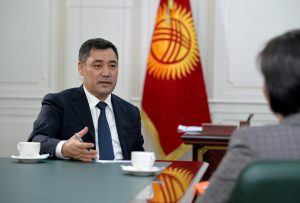The press freedom situation in Russia turned from bad to catastrophic overnight. This is worthy of attention and alarm. But it should also serve as a warning for what is happening nearby — especially since there are more-democratic countries in the region where journalists are now also increasingly in danger.
The atmosphere for a free press in Kyrgyzstan is backsliding. Pressure against independent media in Kyrgyzstan is not new, but the latest developments signal a dangerous and worrisome turn in a country that has been known as the most democratic in the region.
Before President Sadyr Japarov was elected in 2021, he declared his support for the “Treaty on rights and freedoms” during his presidential campaign, pledging to guarantee freedom of speech, democracy, rule of law, and human rights in Kyrgyzstan. But recent events in the last few months throw this pledge into question and show a dangerous precedent for press freedom in the country.
In January, police burst into the offices of OCCRP fellow Bolot Temirov’s independent outlet, Temirov Live, forcing staff to lie on the floor face down with their hands behind their backs. Temirov was arrested and charged with drug possession after police found a small packet of marijuana on him — which multiple witnesses and Temirov himself said had been planted. The police also confiscated the outlet’s computers. It is no coincidence their latest investigation was about an alleged corruption scheme that involved the family of Kamchybek Tashiev, the head of Kyrgyzstan’s security services, which took part in the raid.
Other forces also appear to be doing the government’s bidding. In February, four pro-government activists, supported by a former member of parliament, held a press conference calling for the adoption of a “foreign agent law” and its use against award-winning independent outlets like our member center Kloop and our partner Radio Azattyk. Before Russia invaded Ukraine, the Russian government used such a law to crack down on independent media.
The press conference in Kyrgyzstan was funded by a former member of parliament, Tursunbai Bakir Uulu, who has long been a proponent of “foreign agent” legislation. The speakers — all vocal supporters of Japarov — repeatedly called on Kyrgyzstan’s parliament to adopt a foreign agent law and encouraged public protests against independent media outlets.
Then the government launched a criminal case against another independent outlet, Kaktus Media, alleging “war propaganda” for republishing a story by a Tajik outlet about a recent border conflict between the two countries. These incidents, combined with the introduction of a new “false information” law last August that has been condemned by human rights groups, all add up to a menacing trend for freedom of the press in Kyrgyzstan.
After being surveilled and having their social media accounts hacked, Kloop started a webpage that documents all attacks on media in the country.
Further tightening the noose on independent media, the Kyrgyzstan government proposed last month a new procedure that would allow the Ministry of Culture to block websites accused by anyone of spreading fake news, even in cases where no evidence is provided.
In my work training young journalists in Central Asia on how to investigate crime and grand corruption, I have seen that real change is possible. There’s energy and excitement around investigative journalism; it feels like a new era for the kind of reporting that holds power to account.
OCCRP’s recent investigations with Kloop in Kyrgyzstan showed corruption at the highest levels of government, prompting protests that helped bring down the previous administration and usher in the current administration. It would be a great disservice for Japarov to crack down on one of the very effective tools that actually helped bring him to power. He needs to be more vocal in supporting independent media.
Many people in Kyrgyzstan rushed to Bolot Temirov’s offices as the raid was happening. What happened to Temirov can happen to any citizen, anywhere. Citizens in Kyrgyzstan need to stand up for their journalists. Foreign governments providing aid to Kyrgyzstan need to tie that aid to press freedom and democracy. And funders who care about a free press and democracy need to fund investigative reporting in this important region. This new crackdown on the media can also be taken as a sign that the blossoming investigative journalism in the country is working and is an effective tool against corruption.
We’ve seen how important it is that citizens of a country know the truth and are exposed to more than just propaganda. Critically, Kyrgyzstan still has independent journalists who are able to do their work, hold their government accountable, and show their citizens the truth — for now. But while the world is watching the horrors exacted by Russia in Ukraine, we should not forget that other countries can still be saved from backsliding.

































